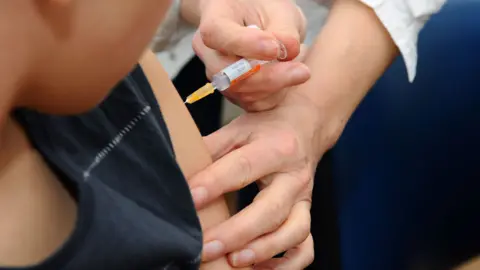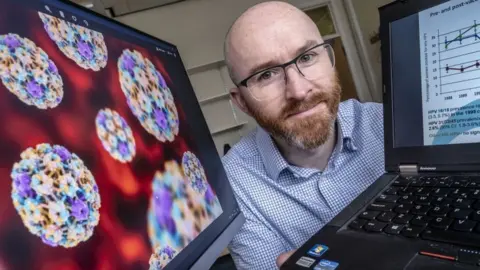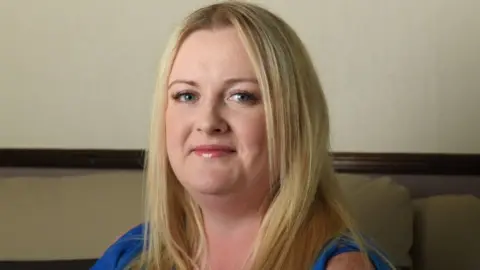HPV vaccine linked to 'dramatic' drop in cervical disease
 Media for Medical
Media for MedicalThe routine vaccination of girls with the HPV vaccine in Scotland has led to a "dramatic" drop in cervical disease in later life, new research suggests.
Human papilomavirus (HPV) is a sexually transmitted infection and some types are linked to cervical cancer.
Researchers said the vaccine has nearly wiped out cases of cervical pre-cancer in young women since an immunisation programme was introduced 10 years ago.
They found the vaccine had led to a 90% cut in pre-cancerous cells.
And they said the effects of the programme had "exceeded expectations".
Over the last decade, schoolgirls across the UK have routinely received the HPV vaccine when they are 12 or 13.
The uptake of the vaccine in Scotland is about 90%.
A team of academics - from Strathclyde, Edinburgh, Aberdeen and Glasgow Caledonian universities - analysed vaccination and screening records for 140,000 women who went for their first cervical screen from 2008-2016.
Their study, published by the BMJ, concluded that Scotland's HPV vaccination programme has led to "a dramatic reduction in preinvasive cervical disease".
It adds that the vaccine is "highly effective" and should greatly reduce the incidence of cervical cancer in the future.

What is the Human Papilloma Virus (HPV)?
 Getty
Getty - HPV is the name given to a common group of viruses; there are more than 100 types of HPV
- Many women will be with infected with HPV over the course of their lifetime without any ill-effect
- In the vast majority of cases, there will be no symptoms and the infection will clear on its own, but in some cases persistent infection can lead to cervical disease
- Some types of HPV are high risk because they are linked to the development of some cancers
- Nearly all cervical cancers (99.7%) are caused by infection from a high risk HPV
- Many types of HPV affect the mouth, throat or genital area. They're easy to catch - you can get HPV from sexual contact.
Source: NHS Choices

Cervical cancer is the second most common type of cancer in women under 35 in UK.
"The findings will need to be considered by cervical cancer prevention programmes worldwide", the study reports.
When the vaccination programme began, researchers thought that the vaccine would knock out two types of HPV, which cause 80% of pre-cancerous conditions.
Instead, they have found it knocks out another three types as well, which means it eliminates nearer 90% of cervical pre-cancer in Scotland.
 Peter Devlin
Peter DevlinUnvaccinated women also showed a reduction in disease, suggesting that the interruption of HPV transmission in Scotland has created substantial "herd protection", researchers said.
Recent studies have also suggested that HPV plays a part in causing other cancers, particularly head-and-neck, vulvo-vaginal and anal cancers.
Dr Kevin Pollock, of Glasgow Caledonian University, said the "impressive" figures confirm that "the HPV vaccine should significantly reduce cervical cancer in the next few years".
He added: "The main message is that the vaccine works. As long as the high uptake continues, the virus has got nowhere to go and it is being eliminated.
"We assessed 140,000 women in this study and because we can link status of vaccination to the disease its impact is indisputable."

Laura's story: 'A smear test saved my life'
 Paul Chappells
Paul ChappellsLaura McAdam, 33, said she wishes the HPV vaccine had been available when she was at school.
In 2016, she was diagnosed with cervical cancer after a routine smear test found changes in her cervix - despite having no symptoms.
Laura said she wished she had the opportunity to get the HPV vaccine at school. She said: "If this injection they are giving at schools now is wiping this out then that is amazing news and I'm definitely all for it.
"I think it's a great idea. I don't see why anybody wouldn't want to get it.
"I would take it in a heartbeat if it's going to stop anyone going through what I've been through."
"You never expect it to happen to you", she added.
'My nightmare will never be over'
Due to complications she was unable to have chemotherapy or radiotherapy, so to remove the cancer she had laser treatment, a hysterectomy and lymph nodes removed.
Ms McAdam, from Ayrshire, does not know whether her cancer will return, so has to have checks every six months.
She added: "Although I've had treatment I don't think my nightmare will ever really be over as I'll constantly be worrying if they got all the cancer or if it's come back.
"I would advise all girls to get vaccinated because there is proof that it works. I would also advise women to go for smear tests. It was a smear test that saved my life.
"I wouldn't wish what has happened to me on my worst enemy."

The research has been welcomed by Jo's Cervical Cancer Trust. The charity's chief executive Robert Music said: "The findings of this research are highly exciting and clearly demonstrate the impact of the HPV vaccine in protecting the cervical health of future generations.
"We are lucky to have such an effective prevention programme which means the elimination of cervical cancer is firmly on the horizon.
"Focusing on communities and areas where take up is below the national average should be a priority."
Public Health Minister Joe FitzPatrick MSP said he welcomed the report in the BMJ. He said it demonstrated "the significant and continued benefits of our vaccination programme".
The study showed the programme "will save lives" and that plans were in place to "build on this success" by extending the HPV vaccine programme to boys later this year.
He added: "It remains important that women continue to take up the invitation for their regular cervical screening as we know it saves lives.
"The test is unique as it can prevent the disease before it even begins, and treatment as a result of screening prevents eight out of 10 cervical cancers from developing."
